IRGC's Quds Commander In Syria Amid Talks Of Possible War
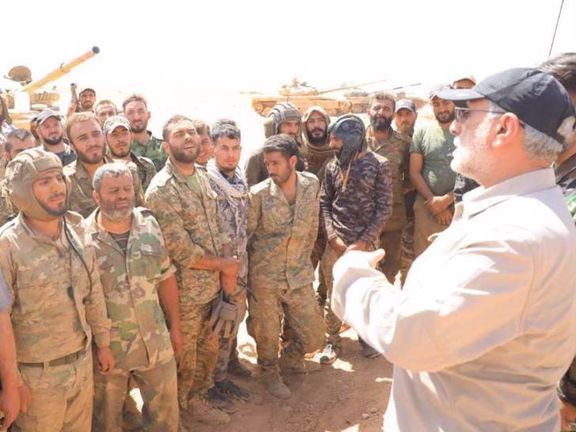
Commander of Iran’s extra-territorial Quds Force, Esmail Qaani, has made a trip to Syria, meeting state and military officials and overseeing “a war game.”

Commander of Iran’s extra-territorial Quds Force, Esmail Qaani, has made a trip to Syria, meeting state and military officials and overseeing “a war game.”
Media affiliated with the Revolutionary Guards said Thursday that he took part in “a joint Iran-Syria drill and visited several regions in line with efforts to help Syria deal with military and security challenges.”
The reports did not provide any details about the nature or location of the drill, but photos released from his trip showed the IRGC commander among a small group of military men in miscellaneous khaki uniforms, a typical feature of Iran-backed militias across the region.
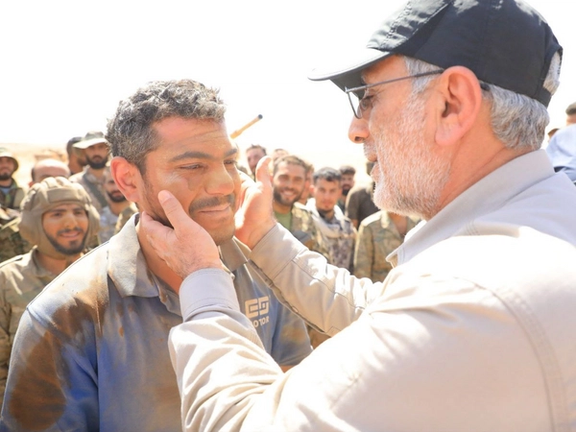
According to reports, he also held talks with senior officials and military commanders in the Syrian capital Damascus. Qaani (Ghaani) was quoted as reiterating the Islamic Republic’s propaganda line that “the US is the main root of chaos, terrorism and fighting in Syria, the region and the world.
“Syria and Iran are brother countries, and they enjoy significant, all-out and deep strategic relations. The Islamic Republic of Iran will be by the side of the Syrian people and leadership in dealing with challenges,” he said.
The visit came against the backdrop of tensions between Iran-backed proxy militias and Lebanese Hezbollah with Israel.
Last month, a former counter-terrorism advisor to two Israeli prime ministers talked of the possibility of Iranian proxies attacking Israel in September or October.
Yigal Carmon, the founder of the Middle East Media Research Institute (MEMRI) and one of Israel’s leading counter-terrorism experts, wrote an August 31st article titled “Signs Of Possible War In September-October,“ in which he argued a “confrontation could result from an uncontrolled deterioration on the ground or from the use of new and unusually deadly weapons by these movements [Hamas and Hezbollah].”
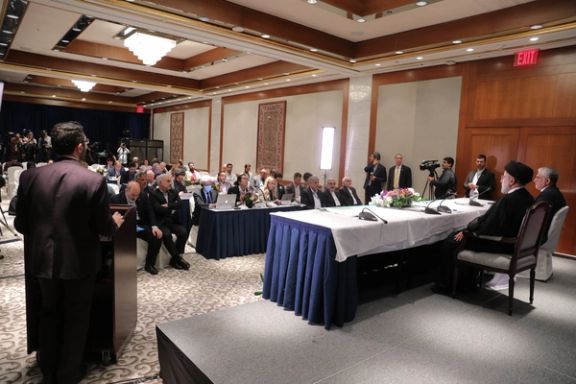
US State Department has strongly condemned threats against Iran International reporters by the entourage of the Iranian president during their visit to the UN this week.
A State Department official sent a statement to Iran International that they "have seen reports of threats, and assault on, an Iran International journalist by a member of the Iranian delegation. The behavior seen in the video footage is unacceptable," the official reiterated.
The Office of the Special Envoy for Iran also posted Thursday a more cautious statement on X, saying that “We condemn the apparent harassment and intimidation of several journalists on U.S. soil. Such behavior is unacceptable.”
Many Iranian Americans and some Iran observers criticized the brief statement by the Special Envoy, especially the use of the word “apparent harassment” when video footage is widely available showing the attack on the Iran International reporter. Unlike the state department’s official, critics noted that the special envoy didn’t even mention that the attacker was a member of the Iranian delegation. More than 230 people posted comments under the statement of the Special Envoy, mostly critical.
The US statements were referring to several incidents when members of President Ebrahim Raisi’s entourage in New York City harassed and in one case physically attacked an Iran International reporter. Journalists working for the Voice of America Persian Service were also harassed.
On Wednesday, an official from Raisi's delegation attacked Iran International correspondent Kian Amani outside the Millenium Hilton New York One UN Plaza Hotel.
The official tried to grab Amini’s cellphone as he was capturing footage of them exiting the hotel. The hotel's security team finally intervened and halted the aggressor.
In another encounter, an official identified as Reza Naghipour – who ironically accompanied Raisi as a protocol coordinator -- was asked by Amani questions about the protesters who were killed during the regime crackdown on dissent last year. But instead of replying or even refraining from answering, Naghipour started to threaten the reporter, telling him that he “should be trembling with fear until the end of his life” because he works for dissident media.
The State Department official said that the Iranian government "repeatedly curtailed press freedom through threats, intimidation, and the use of violence against journalists in Iran." The official added that "the Iranian government has used detentions or forced confessions as tools to suppress their media."
The First amendment protects free expression in the United States, the official said, and "the US government will not tolerate the violent suppression of media freedom in the United States." But what counts for the public is the official statement by the Special Envoy, which has left many annoyed. Former National Security Council official Richard Goldberg tweeted, “You gave them the visas to enable it. Oh and $50 billion. Assassination plots. Drone transfers to Russia. Does anyone say this stuff out loud in your office to recognize the insanity?”
The encounters by Raisi’s delegation have drawn countless reactions by other journalists, human rights activists and even media inside Iran. Earlier this year, Iran International's offices in London were forced to relocate to Washington after repeated threats from the IRGC forced the UK's highest security services to admit they were no longer able to safeguard the lives of the reporting team.
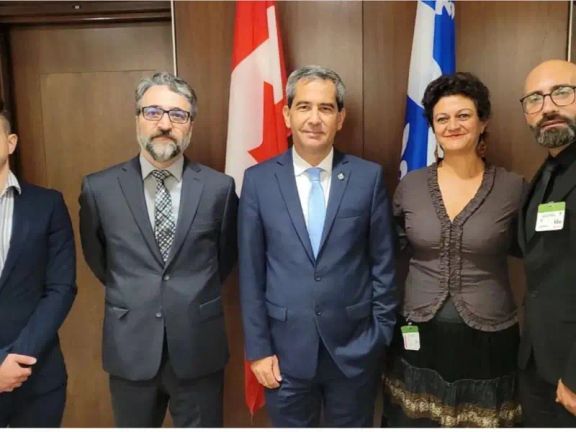
A group of Iranian activists have met several senior Canadian officials to discuss wide ranging issues of concern to the Iranian community and how Canada can help.
Canada’s Justice Minister and Attorney General, Arif Virani, along with several Canadian lawmakers, held separate meetings on Thursday with approximately 15 Iranian activists, including Hamed Esmaeilion, who lost his daughter and wife in the shooting down of Flight PS752 by Iran’s Revolutionary Guard in 2020.
The primary topics addressed during these sessions included the designation of Iran’s Revolutionary Guards, known as the IRGC, as a terrorist organization and the legal grounds for expelling agents and affiliates of the Islamic Republic from Canada.
Discussions also revolved around the plight of refugees, asylum seekers, and families impacted by the Islamic Republic's crimes, including victims of protests and persecuted minority groups such as the LGBTQ community. The activists urged Canada to establish a dedicated refugee program for over 500 Iranians seeking refuge from political persecution.
In a statement issued by the activists, it was noted, "Canada has, regrettably, been too willing to admit individuals with ties to the Islamic Republic but has been less receptive to asylum seekers."
“The IRGC is a murderous and corrupt organization that has killed many Canadians, carried out terrorist acts across the world, and stolen billions from Iran's public coffers,” added the document.
Furthermore, the activists called for continued legal efforts against the Islamic Republic's authorities regarding the PS752 case. Iran has consistently refused to cooperate with international investigations into the incident, which resulted in the tragic loss of 176 innocent civilians.
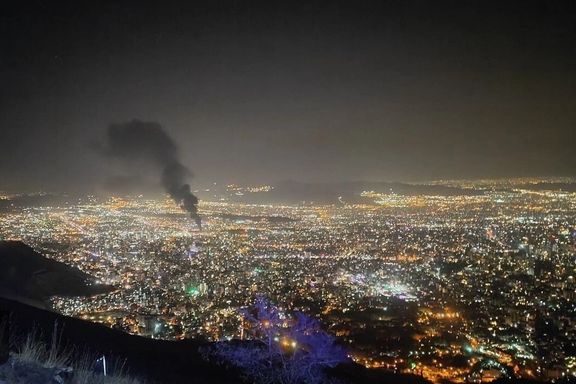
An overnight fire broke out at a warehouse of Iranian defense ministry, the latest in a series of incidents hitting the Islamic Republic's industrial facilities.
State media reported on Friday that the fire at the 2,000-square-meter storage site in the capital Tehran had been extinguished, with no reports of casualties or details regarding damage.
A statement from the defense ministry indicated that the fire had affected one of the plastic material warehouses associated with battery manufacturing and affiliated with the defense ministry. The cause of the blaze remains under investigation.
According to Tehran's fire brigade, the blaze broke out around midnight, and state broadcasters aired footage showing smoke rising from the scene.
Last month, a massive fire occurred in an industrial zone in Doroud, southwest Iran, resulting in two individuals being hospitalized.
Since mid-2020, a series of explosions and fires have taken place in Iran's military, nuclear, and industrial facilities. In March, a substantial fire impacted three warehouses owned by a home appliances manufacturer, while in January, a significant fire broke out at an Iranian military industry factory in Esfahan (Isfahan), with suspicions of a drone strike. Iran attributed the strike to Israel, although the claims were never officially confirmed.
Late in August, Iran reiterated its accusations against Israel, alleging its involvement in a failed plot to sabotage Iran's defense industry and missile production. Iranian authorities stated that a network of agents had attempted to introduce faulty components into the production of advanced missiles.
Israel has consistently maintained its willingness to target Iranian facilities if diplomatic efforts fail to restrain Iran's nuclear or missile programs, although it refrains from commenting on specific incidents.
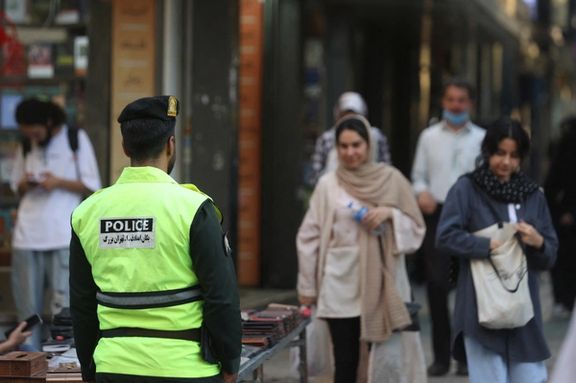
Amnesty International has decried Iran’s new hijab law that will impose “draconian penalties” and increase prison terms and fines for defying compulsory veiling.
In a statement issued Thursday, Diana Eltahawy, the human rights group’s deputy regional director for the Middle East and North Africa said, “This bill is a despicable assault on the human rights of women and girls that will further entrench violence and discrimination against them in Iran.”
Earlier in the week, Parliament Speaker Mohammad-Bagher Ghalibaf announced that the bill was approved for a "three-year trial run" following coordination and a written confirmation by the judiciary. The contentious bill's content was finalized by a committee of approximately 10 lawmakers making the best use of an obscure regulation known as Article 85. The only aspect voted upon was the duration for the trial implementation.
Article 85 of the constitution enabled the parliament to effectively sideline opposition by restricting discussions on the bill to an internal committee. The committee's decisions are set to be sent to the Guardian Council, whose members are chosen by Supreme Leader Ali Khamenei. If the council deems the decisions to be in line with the Constitution, they will be implemented throughout the country. Legal experts say the hijab bill violates not only civil rights but also the Constitution and requires vast resources beyond the government’s means.
Eltahawy said that the new regulations will further “exacerbate the already suffocating surveillance and policing of women’s bodies, ”mandating the Islamic Republic’s various political, security and administrative bodies to “obsessively observe compliance with compulsory veiling laws and control women’s and girls’ lives.”
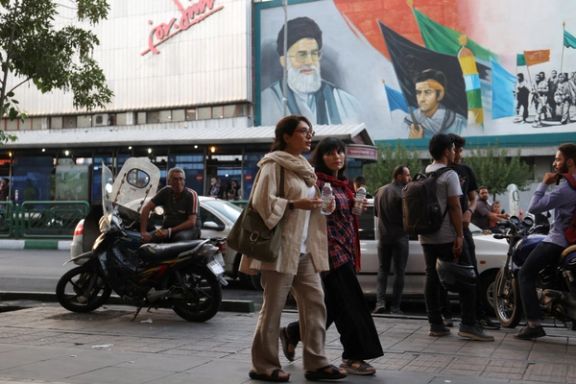
Initially comprising only 15 articles, the "Hijab and Chastity" bill was sent to parliament by the administration of Ebrahim Raisi. It has since expanded to include 70 articles. The bill was proposed after months of nationwide protests following the death of Mahsa Amini, a 22-year-old woman who died in police custody last year, allegedly for breaching hijab rules.
The uprising sparked by the death in police custody of Mahsa Amini in September 2022 has made it increasingly difficult for the clerical regime to enforce the mandatory Islamic dress code. Since the beginning of the ‘Women, Life, Freedom’ movement, tens of thousands of girls and women have shed their compulsory hijab. The regime seeks to criminalize hijab defiance, but no branch of government wants to solely shoulder the responsibility for complications of such a provocative and risky action in society.
Amnesty International's Eltahawy further described the bill as an "all-out assault," meant to "crush the spirit of resistance among those who dared to stand up against decades of oppression and inequality as part of the 'Women, Life, Freedom' popular uprising."
She also called on the global community to pressure the Islamic Republic's authorities to revoke the bill and abolish all degrading and discriminatory compulsory veiling laws and regulations, stating that the world must "pursue legal pathways at the international level to hold Iranian officials accountable for ordering, planning, and committing such widespread and systematic violations against women and girls."
Human rights advocates have warned that the bill's implementation could lead to “increased violence, harassment, and arbitrary detentions of women and girls in Iran.” Both the United Nations Human Rights Commission and the UN's Independent International Fact-Finding Mission on the Islamic Republic of Iran have issued statements this month expressing their concerns over the potential consequences of this bill on the rights and freedoms of Iranian women.

Israeli Prime Minister Benjamin Netanyahu has told Iran International that Israel is “committed to prevent Iran from having nuclear weapons”.
In a brief interview while in New York for the UN General Assembly, Netanyahu said “the Ayatollah regime having nuclear weapons… should be a concern of all civilized nations.”
He refused to comment on what Israel would do next if the Islamic Republic were to ignore the UN nuclear watchdog, the IAEA, and the international community and carry on with the program.
“We will prevent them,” he said, insisting that the unscheduled, on-the-go interview wasn’t the ‘form’ for a more specific answer.
Netanyahu and other senior Israeli officials have repeatedly suggested that they would consider all options to stop Iran having nuclear weapons.
The topic surfaced once more on Wednesday when President Biden and Netanyahu met in New York. And Netanyahu was much clearer in that meeting.
“That shared goal of ours can be best achieved by a credible military threat, crippling sanctions, and supporting the brave men and women of Iran who despise that regime and who are our real partners for a better future,” he said.
The authorities in Iran have always maintained that Iran’s nuclear activities are peaceful. Raisi reiterated this in his speech at the UN General Assembly, condemning the US for ‘breaking the promise’ and leaving the JCPOA nuclear accord.
As Iran has accumulated more than 100 kg of uranium enriched to 60 percent and continues to refine more, concerns have risen. Tehran also banned several IAEA inspectors this month, which was condemned by the United States and its European allies.
Earlier this week, UN nuclear chief Rafael Grossi told Iran International that such measures make it impossible for IAEA to verify the nature of Iran's nuclear program. He said he would try to meet Raisi to ask him to reverse the decision to expel “a very sizable chunk” of the agency’s inspectors.
But Iran’s President sounded unaffected by the warnings. On his last day in New York, Raisi said the Islamic Republic would not bar inspectors, “but if trust is lost in some inspectors, then the distrusted will be returned.”
Critics of Biden policy on Iran say his soft approach has emboldened the Islamic Republic to pursue a more aggressive strategy in the region, especially after receiving $6 billion in frozen oil revenues.
“The West may think providing carrots—$6 billion—to Khamenei’s regime will lead to de-escalation,” Kasra Aarabi, director of United Against Nuclear Iran, posted on X, “but it’s having the opposite effect. It’s resulted in an overinflated sense of confidence in Tehran, which will increase the regime’s recklessness & strategic errors.”
Last month, Netanyahu blamed Iran for a terror attack that killed a mother of three near Hebron. “We are in the midst of a terrorist assault,” he said, directed and financed by Iran and its proxies”.
That attack in Hebron was celebrated by Hamas officials in Gaza –who are supported by the Islamic Republic.
Israel is trying to reach a peaceful settlement with Arab countries to put more pressure on Palestinians and isolate Iran. Netanyahu emphasized this in his latest meeting with Biden in New York.
“I think that under your leadership, Mr. President, we can forge a historic peace between Israel and Saudi Arabia,” he said. “And I think such a peace would go a long way… to advance the end of the Arab-Israeli conflict… and advance a genuine peace between Israel and the Palestinians.”






